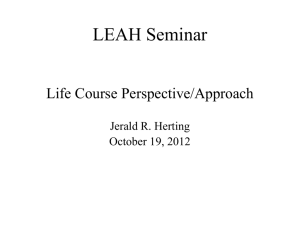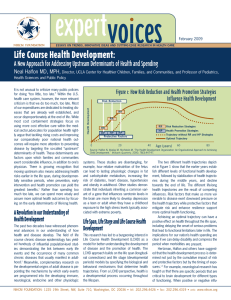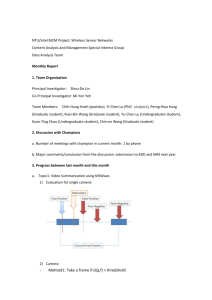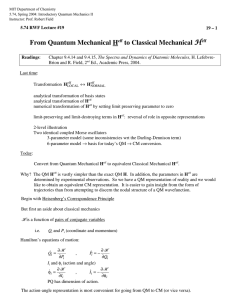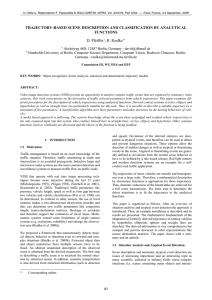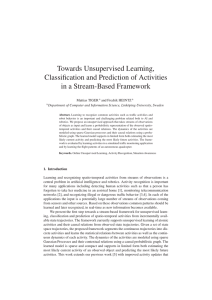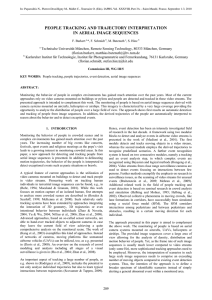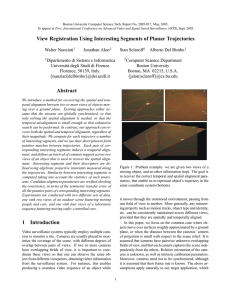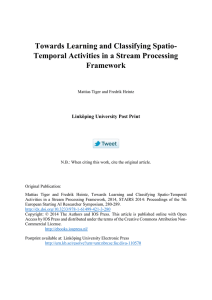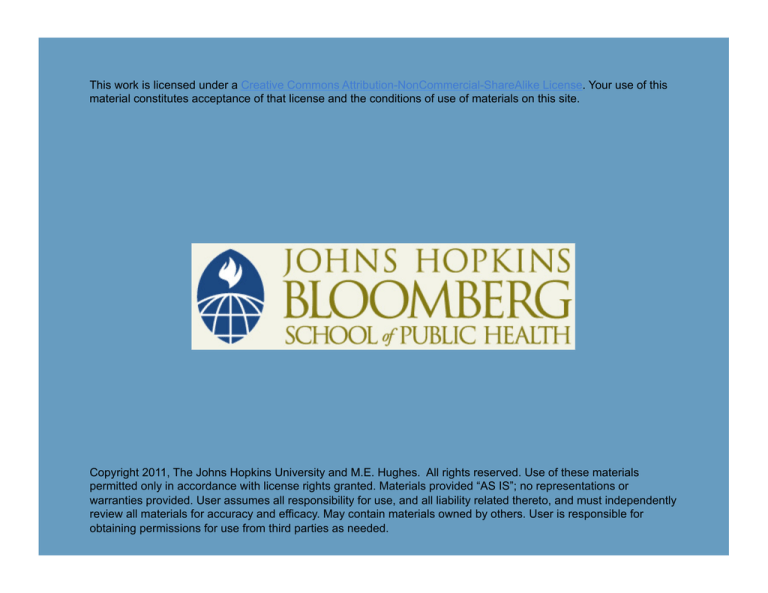
This work is licensed under a Creative Commons Attribution-NonCommercial-ShareAlike License. Your use of this
material constitutes acceptance of that license and the conditions of use of materials on this site.
Copyright 2011, The Johns Hopkins University and M.E. Hughes. All rights reserved. Use of these materials
permitted only in accordance with license rights granted. Materials provided “AS IS”; no representations or
warranties provided. User assumes all responsibility for use, and all liability related thereto, and must independently
review all materials for accuracy and efficacy. May contain materials owned by others. User is responsible for
obtaining permissions for use from third parties as needed.
The Life Course, Human Development, and Health
M. E. Hughes, PhD, MA
Johns Hopkins University
Section A
What Is a Life Course Perspective on Health?
A Life Course Perspective
Conceptualizes health as the reflection of an underlying
developmental trajectory
Trajectory is multidimensional
- Biological, psychological, behavioral, and social aspects
What “health” means varies by position on this developmental
trajectory (i.e., by age)
4
Developmental Trajectories
Some aspects are “hard wired”
Most aspects are highly plastic
Specific trajectory reflects transactions between an individual and
the contexts in which he or she is embedded
5
Analysis from a Life Course Perspective
Examines underlying developmental trajectories
Distinguishes key contextual influences
Identifies biological, psychological, behavioral, and social processes
linking contexts and health
6
A Theoretical Orientation
“Establishes a common field of inquiry by defining a framework that
guides research in terms of problem identification and formulation,
variable selection and rationales, and strategies of research design
and analysis” (Elder and Shanahan, 2006)
Helps one to make causal connections and should lead to theories
A powerful approach for explanation, identifying points of
intervention, and designing policy
7
Specific Applications …
Hayman and Hughes. (2006). Progress in Prevention: Prevention of
Cardiovascular Disease a Life Course Ecological Perspective.
Kuh and New Dynamics of Ageing Preparatory Network. (2007). A
Life Course Approach to Healthy Aging, Frailty, and Capability.
Lu and Halfon. (2003). Racial and Ethnic Disparities in Birth
Outcomes: A Life Course Perspective.
Northridge and Lamster. (2004). A Life Course Approach to
Preventing and Treating Oral Disease.
Symonds. (2009). Nutrition and Its Contribution to Obesity and
Diabetes: A Life-Course Approach to Disease Prevention?
Walco. (2004). Toward an Integrated Model of Pain over the Life
Course.
Whalley, Dick, and McNeill. (2006). A Life-Course Approach to the
Aetiology of Late-Onset Dementias.
8
General Applications …
Alwin and Wray. (2005). A Life-Span Developmental Perspective on
Social Status and Health.
Ben-Shlomo and Kuh. (2002). A Life Course Approach to Chronic
Disease Epidemiology: Conceptual Models, Empirical Challenges and
Interdisciplinary Perspectives.
Halfon and Hochstein. (2002). Life Course Health Development: An
Integrated Framework for Developing Health, Policy, and Research.
Hertzman. (1999). The Biological Embedding of Early Experience
and Its Effects on Health in Adulthood.
Singer and Ryff. (1999). Hierarchies of Life Histories and Associated
Health Risks.
9
Origins: Epidemiology
Focus on long-term origins of disease and/or the natural history of
disease, especially chronic conditions
Not new within epidemiology, just more prominent
Three strands of research led to renewed emphasis
- British cohort studies
- Fetal origins
- Health inequalities research
10
Origins: Social Science
Focus on individual lives, social pathways
- Life course as a concept
Established by Glen Elder
- Children of the Great Depression (1974)
Research examines how historical time, place, and social
institutions shape lives
- Transitions, trajectories, turning points
Principal health outcome mental health; less emphasis on biology
and more on social determinants
11
Origins: Social Science
Focus on individual lives, social pathways
- Life course as a concept
Established by Glen Elder
- Children of the Great Depression (1974)
Research examines how historical time, place, and social
institutions shape lives
- Transitions, trajectories, turning points
Principal health outcome mental health; less emphasis on biology
and more on social determinants
12
Clarifying Terms
Life span: length of time species is capable of living or length of an
individual’s life
Life cycle: regular and predictable series of life stages or species
reproductive cycle
Life course: age-graded developmental trajectories shaped by
contexts
13
Clarifying Terms
Life span: length of time species is capable of living or length of an
individual’s life
Life cycle: regular and predictable series of life stages or species
reproductive cycle
Life course: age-graded developmental trajectories shaped by
contexts
14

